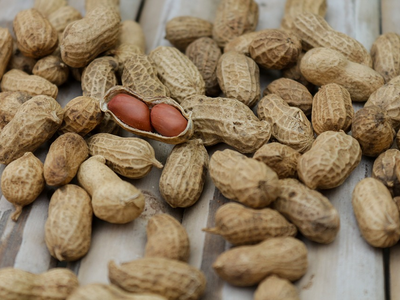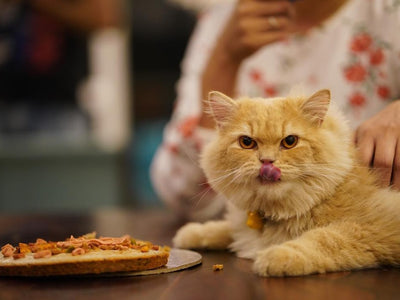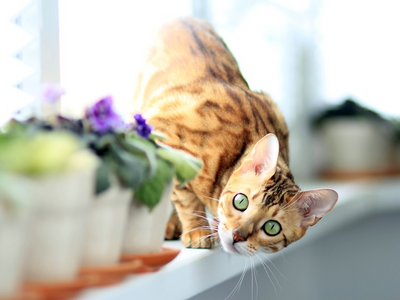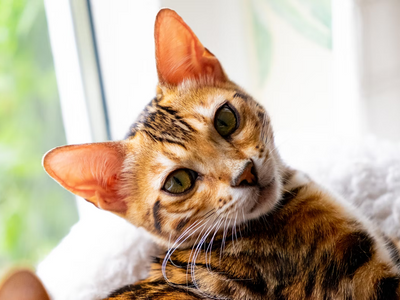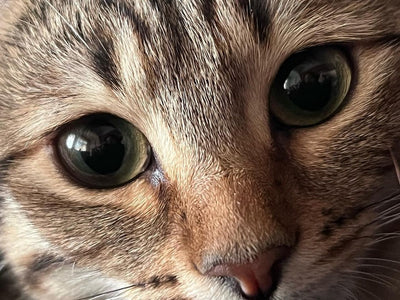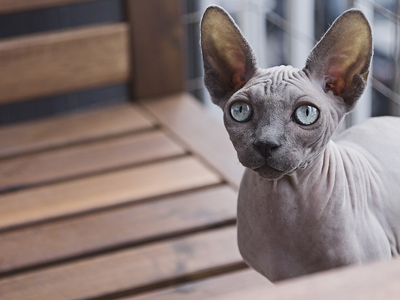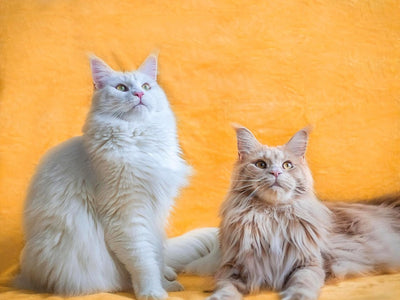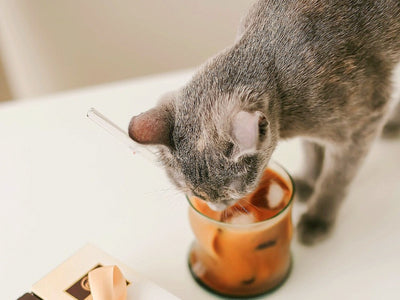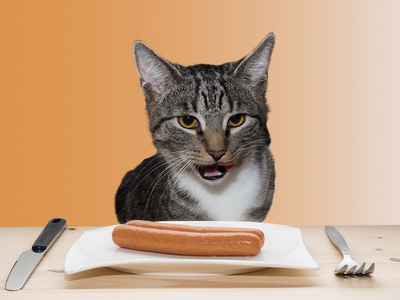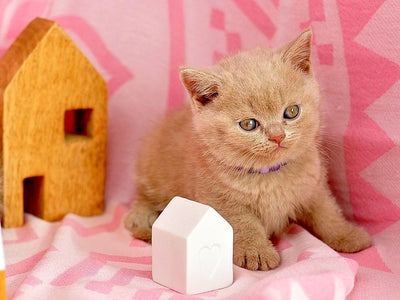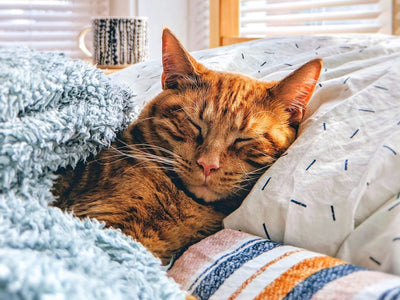28.09.2021
Is your cat not eating? Untamed helps you find out what the issue might be
Any change in your feline friend’s behaviour is worrying, but when the cat stops eating their usual food, you need to find the cause as quickly as possible.
Your cat could be refusing to eat because of a recent change in diet, a sore in their mouth, or a minor tummy upset, but there may be another underlying health issue that needs to be identified and treated.
Untamed takes a look at the possible causes of a cat not eating and gives you the best advice on how to get the feline back to their normal food routine.

Nooooot haaaaaappppy!
Source: EVG Culture
What does it mean when a cat stops eating?
As a concerned and dedicated cat parent, you watch your kitty like a hawk.
Cats tend to be creatures of habit, and mealtimes are regular and predictable. You know that your kitty will resort to insistent, beguiling stares at a certain time of day and that resistance is futile.
When this doesn't happen, your alarm bells go off immediately, and you start panicking.
There is a number of reasons why this happens—some trivial, some more serious. Your kitty could be losing interest in food due to:
- An injury or trauma
- A short-term illness
- An underlying chronic condition
- Something they’re being fed on
Let’s look into each of these causes in detail.
What kind of injury could stop your feline from eating?
Cats like to keep to themselves—when they’re hurt, they are more likely to seek solitude than come to you for help.
Getting injured can cause cats to lose their appetite or suspend feeding, and the most common injuries or traumas that lead to this are:
- Tooth problems
- Lacerations in the mouth
- Gum disease
Tooth problems
If your kitty has recently given in to their natural curiosity and tried to chew on something a bit too hard, a fractured or loosened tooth may be causing trouble.
Given that a scenario like that could cause quite a serious toothache, you can understand the cat's reluctance to put anything near the source of the pain.
Lacerations in the mouth
Chewing on a thorny twig, a sharp object, or a bone splinter can cause lacerations in the cat's mouth.
While the pain won’t be as intense as that of a cracked tooth, your kitty might be sore enough to avoid food until the wound heals.
Gum disease
Numerous studies have shown that gum disease in cats can be a serious issue, potentially leading to other health problems as harmful bacteria from the mouth spread to the rest of the body.
Periodontal disease is the most common problem vets deal with—eight out of ten cats over the age of three can be expected to suffer from gum inflammation.
Inflamed gums make eating painful, so your cat may refuse food while their immune system tries to combat the inflammation.
The difficulty with diagnosing a problem in your feline friend’s mouth is that they’re not willingly going to let you examine them.
If you notice that your cat seems hungry but won’t eat, you may have to take them to a vet to have the oral cavity checked thoroughly.
Vets are used to performing this kind of examination, but even they sometimes resort to a general anaesthetic to be able to do it properly.
Your cat won’t eat? These short-term illnesses could be the cause!
Any number of short-term conditions can cause your cat not to eat or drink for a short time, but the most common reasons are:
- Respiratory infections
- Tummy upsets
- Digestive issues
Respiratory infections
If your kitty is having difficulty breathing or is suffering from a blocked nose, their ability to smell and taste food could be compromised.
The smell is a crucial sense in cats, and without a fully functioning sense of smell, they may temporarily lose interest in their food.
Tummy upsets
If a hairball is forming or your cat has eaten something outside that disagrees with them, they may be feeling nauseous and reluctant to eat. They probably won’t eat until the problem has sorted itself out.
Allergic reactions to specific foods are also common in cats—you should switch your cat to a single-protein source hypoallergenic diet if you suspect your kitty is allergic to something in the food they're on.
Digestive issues
Cats can suffer from various digestive problems, including:
- Bacterial infections in the gut
- Parasites
- Irritable bowel disease
- An obstruction
The first three issues are easily treatable, but an obstruction in the bowel is a serious matter and will have to be investigated by a vet using:
- An endoscopy
- Ultrasound
- An X-ray
Often, the cat will manage to deal with the obstruction with proper medication. In the worst-case scenario, a vet may have to perform surgery to remove the obstruction, but a speedy diagnosis is crucial either way. If you suspect a bowel obstruction, you should waste no time and get your moggie checked.

Can uncle doctor make me better, mummy?
Source: Tranmautritam
Can not eating be a sign of something more serious?
All of the above cases are treatable and may even clear up quickly on their own, but anorexia is much more difficult to diagnose and treat. The most common health issues that can cause anorexia in cats are:
|
Cause |
Explanation |
|
Kidney disease |
Kidney disease—also known as renal insufficiency—is difficult to deal with as the effects only become noticeable when your feline has lost 75% of the kidney function. One of the first signs of reduced renal efficiency is the loss of appetite |
|
Diabetes |
Diabetes rarely causes appetite loss—it usually makes cats eat more due to their body being unable to absorb glucose. It can also cause nausea and a lack of appetite, though. Your vet will routinely check for diabetes if your kitty becomes anorexic |
|
Immune system disease |
Cats can contract various immune system diseases, such as:
|
|
Cancer |
Any form of feline cancer can lead to the loss of appetite in a cat—regardless of whether it is local to the gastrointestinal tract or not |
|
Stress |
A change of surroundings, the arrival of a new pet, or another environmental factor can lead to your cat becoming anorexic. A vet will normally investigate this after all the above issues have been checked and ruled out |
If your cat is lethargic and not eating or won’t eat but will drink, a trip to the vet should be the first thing on your agenda. That way, you will eliminate any serious disease from the get-go or start treatment before their condition exacerbates.

Your vet can identify whether there are any problems in a flash
Source: Tima Miroshnichenko
What can happen if your cat doesn’t eat for longer than a day?
If your cat doesn’t eat for more than 24 hours, you need to consider the possibility of an underlying condition that's affecting their appetite.
Longer-term appetite loss is a serious problem for cats. If kitties don’t eat for 24 hours or more, they could be suffering from:
|
Results of extended anorexia |
Explanation |
|
Hepatic lipidosis |
Since the cat hasn't eaten in a good while, they start to draw energy from the fat deposited in their body. That can cause a strain on their liver and lead to irreversible liver damage unless it is treated with a strict dietary regime. The treatment can last up to seven weeks |
|
Organ damage or failure |
When the liver's function is compromised, a knock-on effect can be observed in the:
|
Not eating for 24 hours or more is a sign that your kitty is suffering from something serious and should be checked by a vet as quickly as possible.
How to get a cat to eat again

Leave me alone, I’m not well
Source: Pixabay
Getting your feline friend to eat again requires patience, persistence, and dedication on your part.
A vet may give you some tips and prescribe medication to alleviate any symptoms affecting your cat’s appetite. These can include:
|
Meds to alleviate symptoms |
Explanation |
|
Antacid |
An antacid can reduce any inflammation in the stomach lining and oesophagus, meaning that your kitty will feel more comfortable eating |
|
Anti-nausea medication |
Anti-nausea medication, or antiemetics, can calm a kitty’s stomach and relieve the urge to vomit. Over-the-counter products are available, but your vet is the best person to determine whether this is the correct course of action |
|
Intravenous fluids |
If your feline is dehydrated, a vet may suggest intravenous fluids to restore hydration and maintain mineral balance |
|
Appetite stimulants |
Mirtazapine stimulates a cat’s appetite and can be prescribed by a vet—if your kitty has a clinical condition, reinvigorating the appetite can be crucial as many medications are also administered orally |
|
Supplements to address imbalances |
If your vet has diagnosed low levels of minerals or other elements in your kitty’s blood, they may be prescribed supplements |
Besides vet-approved medication, there are several approaches you can try yourself to get your cat to eat normal again, such as:
- Adding wet food to your cat’s favourite dry diet
- Heating their food to body temperature (around 38° centigrade)
- Adding a flavourful cat jelly or cat gravy to your kitty's regular meals
- Switching them to a high-protein, low-fat diet
- Preparing tailor-made meals
How to make a cat eat? Make the food as tasty and enticing as possible—knowing what cats crave is your first step!
What to feed a sick cat that won’t eat
The key to getting your kitty back into a normal eating routine is understanding what cats need and love to eat.
Cats are obligate carnivores, meaning that their bodies are designed to eat a meat-based diet. Their diet should ideally consist of:
- Animal proteins
- Animal fats
- Essential vitamins and minerals
Animal proteins
Animal proteins deliver the essential amino acids in the most efficient way, meaning that you do not need to feed cats huge portions to get them on the road to recovery.
The most digestible animal proteins for a cat come from:
- Chicken or turkey
- Duck
- Fish and crustaceans, such as tuna, salmon, shrimps, prawns, mackerel, and sardines
- Liver
You should try to avoid food that contains grains, cereals, or other vegetable protein sources as they are more difficult for your cat to metabolise efficiently.
Animal fats
Animal fats ensures your cat has enough energy for their metabolic processes and daily activities, as well as that they receive the fatty acids required to maintain healthy bodily functions.
The good news is that animal fat also makes your kitty’s food tasty—this is crucial in cats that have been disinterested in their food. Animal fat is an easy way to get their mouth watering.
Felines that are recovering from an illness need a lot of calories in small portions—a tiny portion of quality animal fats in their diet delivers this.
Essential vitamins and minerals
While your cat is getting used to eating normal again or fighting anorexia, they must maintain the balance of the essential vitamins and minerals in their organism.
Animal-based foods such as liver deliver many of the vitamins and minerals your feline friend needs to get back to full strength.
The ideal percentages you should aim for in your cat’s diet are:
|
Nutrient group |
Target percentage |
|
Protein |
Over 50% |
|
Fat |
Up to 20% |
Some cat owners favour uncooked diets—this is fine as long as you maintain a rigorous hygiene regimen and make sure the meat you use is free from:
- Salmonella
- Listeriosis
- E. coli
The cooking process destroys the harmful bacteria and anti-vitamins, such as avidin or thiaminase, from raw meat.
If you are wondering about how much to feed your feline after an illness, the rule of thumb is little and often. Here are the foods they must not eat under any circumstances.
Untamed food can get your kitty on the right track
Untamed understands how sensitive cats can be.
Even under normal circumstances, felines will routinely turn their noses up at food they’ve been happy to eat for weeks. Don’t ask for a reason—all you’re likely to get is a reproachful look and a cold shoulder.
If your kitty is feeling under the weather, providing them with something tasty and nutritious is vital to help them recover.
Untamed gets this, and we prepare our diets following these principles:
- Only human-grade ingredients—We only use premium cuts of meat and organs fit for human consumption, skipping iffy fillers like meat and animal derivatives that are heavily processed and hard to digest
- Vet-formulated recipes—All our formulas are designed by vets, so your kitty’s guaranteed to get all the protein, fat, vitamins, and minerals they need to thrive
- Gentle steam-cooking—Our steaming process makes sure that harmful bacteria are eliminated, and all the good stuff is sealed in
- Protein-rich formulas—We include twice the amount of animal protein compared to cat food industry standards, so your kitty gets the amino acids they need to prosper
- Hypoallergenic meals—By only using fresh, natural ingredients in each meal (no known allergens, flavour enhancers, harsh grains, or chemical preservatives), we can make sure that even sensitive cats can enjoy our meals without a worry
Untamed is the best way to get your feline back to full strength after a bout of not eating—switch to Untamed and see how your kitty goes wild for our food!
Try Untamed food to get your kitty back on their feet!

Your kitty will do anything to get Untamed cat food!
Image (c) Untamed
Watching a cat suffer is torture for any cat parent, so it's only natural you'll do anything in your power to ensure they feel better as quickly as possible.
Selecting the right Untamed formula for your kitty is easy—you can customise a meal plan based on the info you provide about your cat's:
- Favourite flavours and specific taste in food
- Life stage
- Sensitivities
- Allergies
Here’s how to get your cat food trial started:
- Go to our Try Now page and fill out the questionnaire
- Check out our meal plans
- Order your trial pack online
In no time, your trial pack will arrive on your doorstep, and you should be able to see your cat work up an appetite in no time.
Your kitty’s new fave food will be delivered to your door to ensure a regular supply. You can freeze or cancel an order at any time, but you should notice:
- More energy and a less messy litter tray within a week
- A glossy coat and better muscle tone within two months
- Natural weight management and better resilience for the rest of their life
Give Untamed cat food subscription service a try—your kitty will love you for it.

![Associated image for What human food can Sphynx cats eat? [Comprehensive list]](http://untamed.com/cdn/shop/articles/what_human_food_can_sphynx_cats_eat_Featured_400x300_crop_center.jpg?v=1648705074)
